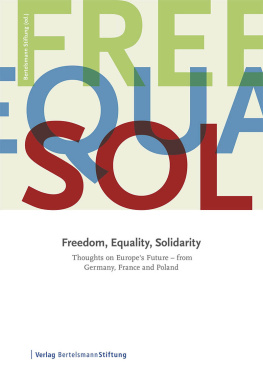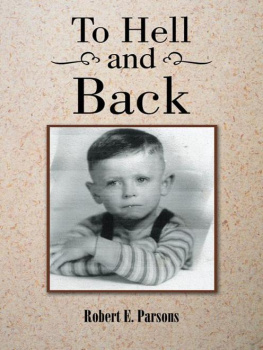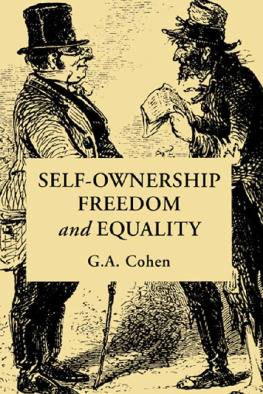Bertelsmann Stiftung (ed.)
Freedom, Equality, Solidarity
Thoughts on Europes Future from
Germany, France and Poland
With contributions by
Marianne Birthler
Marek A. Cichocki
Daniel Cohn-Bendit
Heiner Geiler
Andr Glucksmann
Dilek Gngr
Martin Hirsch
Adam Krzemiski
Jacek Kucharczyk
Adam Michnik
Aleksandra Niyska
Jean-Fabien Spitz
&
photographs by
Klaus Mellenthin
Micha Szlaga
Antnia Torres
Table of Contents
Joachim Fritz-Vannahme and Armando Garca Schmidt
|
Marianne Birthler
A Conversation with Daniel Cohn-Bendit
Adam Krzemiski
|
Dilek Gngr
Martin Hirsch
Jacek Kucharczyk and Aleksandra Niyska
|
Heiner Geiler
Jean-Fabien Spitz
Marek A. Cichocki
|
A Conversation with Andr Glucksmann and Adam Michnik
|
Introduction
JOACHIM FRITZ-VANNAHME AND ARMANDO GARCA SCHMIDT
The idea for this book emerged from the depths of a crisis that posed unprecedented challenges to the European Union, leaving many in Europe with serious doubts about the Union and its future. The following essays and conversations address the guiding principles of modern Europe freedom, equality and solidarity from French, Polish and German viewpoints. In so doing, they represent a reflective moment in which each author reconsiders his or her country, in the midst of Europe, with a critical eye to the past and recalibrated expectations for the future.
As trust dissipates and fears proliferate during this era of bank, debt and state crises, there is urgent need for reflection on many things: Why is there a European Union? Why do 27 member states and a half billion people cultivate, day by day, a culture of contentious debate as an integral feature of peaceful coexistence? What is it that holds the Union together at its core? A common budget of a mere one percent of its total GDP? A handfull of common institutions, most of which are often referred to simply as Brussels? A single market featuring widely applicable rules and freedom of movement for goods, people, capital and services?
These things alone will not hold the EU together. It is no accident that Article 2 of the Treaty of Lisbon begins with a reference to the values upon which the Union is founded: respect for human dignity, freedom, democracy, equality, the rule of law and respect for human rights. The values identified here are key to pluralism, tolerance, solidarity and gender equality. There is much talk of a European community of values. But what, exactly, does it mean or entail? In this publication, German, Polish and French nationals have come together as Europeans with their respective history, culture and tradition in hand. What divides them? How are they different? What unites them when it comes to concepts such as freedom, equality and solidarity?
The illustrious principles of freedom, equality and solidarity have undergone transformations in each of these countries. In some, this has been a slow process spanning a century; in others, like Poland, the change came with breathtaking speed, spanning only two to three decades. But it is more than history that connects these principles; they are connected as well by the network of relations that the contributors here underscore, often in surprising ways. Freedom and equality may have been the banner theme under which Enlightenment and revolutionary thinkers rallied in the 18th century, but without solidarity, freedom can devolve into the selfish pursuit of singular interests, and equality loses the lustre of diversity. Solidarity is therefore also addressed in the pages that follow.
In selecting our contributors, we paid no attention to age, profession, political party or religious background. We were simply interested in capturing what these individuals have to say, each of whom have addressed the broad terrain of these principles in their native Germany, Poland or France either by way of a public speech, a publication or their personal life story. Our only criteria was that each principle be considered from a German, Polish and French perspective. The points of view offered were left entirely up to the contributors.
The intellectual pursuits of the contributors are mirrored in the eyes of three photographers who sought to capture images of freedom, equality and solidarity in everyday life in each country. The only explicit connection between text and image are these three principles. Thus, the photographs are not intended to visualize the texts; they represent instead three additional approaches to reading the principles of freedom, equality and solidarity by other means.
The book demonstrates that the ideas of freedom, equality and solidarity continue to capture the avid attention of Europeans. But for those who might think these principles are safe and secure within the European Union, the contributors point to sobering developments: inequalities within and between the member states are growing; solidarity as a task of the Union has been battered by arguments over debt servicing and austerity measures; and the freedoms suffering restrictions in neighbor states to the south and east are under (sometimes open) fire in member states, as well. Given this state of affairs, we believe this book and its contributions hold particular urgency. The principles of freedom, equality and solidarity cannot be taken for granted within the European Union ensuring their viability requires constant attention.
Western Freedom Eastern Freedom? Toward a Common Culture of Memory
MARIANNE BIRTHLER
The Englishman loves liberty as his lawful wife, and if he does not treat her with remarkable tenderness, he is still ready in case of need to defend her like a man, and woe to the red-coated rascal who forces his way to her bedroom let him do so as a gallant or as a catchpoll. The Frenchman loves liberty as his bride. He burns for her, he is aflame, he casts himself at her feet with the most extravagant protestations, he will fight for her to the death, he commits for her sake a thousand follies. The German loves liberty as though she were his old grandmother.
What Heinrich Heine satirized in the 19th century appears true to this day: While many Germans certainly prize their freedom, it hardly tops their hierarchy of values. Indeed, quite a few Germans view freedom with suspicion, equating it with selfishness and free-market radicalism. The risks and burdens of an open society are mounted as arguments against the principle of liberty. Self-will, responsibility and a liberal attitude toward life have difficulty competing with the enticements of a protective and custodial social order.
For three generations, most Germans have lived in a free country whose democratic institutions, structures and practices are regarded as stable and exemplary. This stability is underpinned by the value that the great majority of the citizens of the former West Germany place on liberty and democracy and by the fact that their experience of freedom in the past six decades was consistently linked to rising prosperity, economic power and internal as well as external security.









